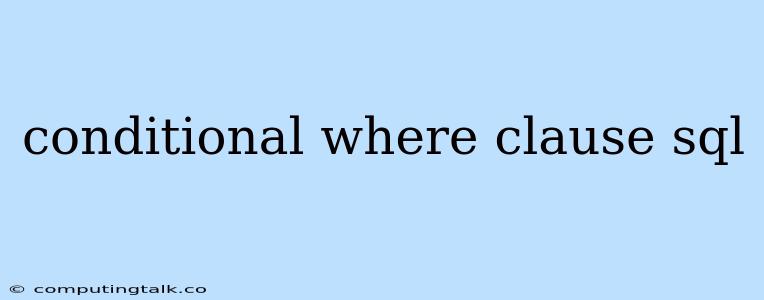The WHERE clause is a fundamental part of SQL (Structured Query Language) that allows you to filter data in your database tables based on specific conditions. It helps you retrieve only the relevant information you need, making your queries more efficient and targeted. In this article, we'll explore the power of conditional WHERE clauses and how they can enhance your SQL queries.
Understanding Conditional WHERE Clauses
Imagine you have a table called "Customers" with columns like "CustomerID," "Name," "City," and "Country." You want to retrieve the information of customers who reside in a specific city, say "New York." Here's where the WHERE clause comes into play.
SELECT *
FROM Customers
WHERE City = 'New York';
This simple query uses an equality operator ("=") to filter the data. It fetches all records where the "City" column value matches "New York."
Key Concepts of Conditional WHERE Clauses
Conditional WHERE clauses utilize various operators and expressions to specify the conditions for data filtering. Here are some important concepts:
1. Comparison Operators
Comparison operators are used to compare values and define conditions. Here are some commonly used operators:
- Equal to (=): Returns true if the values are equal.
- Not equal to (!= or <>): Returns true if the values are not equal.
- Greater than (>): Returns true if the left operand is greater than the right operand.
- Greater than or equal to (>=): Returns true if the left operand is greater than or equal to the right operand.
- Less than (<): Returns true if the left operand is less than the right operand.
- Less than or equal to (<=): Returns true if the left operand is less than or equal to the right operand.
Example:
SELECT *
FROM Customers
WHERE Age >= 18; -- Retrieve customers 18 years old or older
2. Logical Operators
Logical operators combine multiple conditions, allowing for more complex filtering.
- AND: Returns true if both conditions are true.
- OR: Returns true if at least one of the conditions is true.
- NOT: Reverses the truth value of the condition.
Example:
SELECT *
FROM Customers
WHERE City = 'New York' AND Country = 'USA'; -- Customers in New York, USA
3. Wildcards
Wildcards are characters that represent one or more characters in a pattern match. They are used for partial string comparisons.
- %: Represents any number of characters.
- _: Represents a single character.
Example:
SELECT *
FROM Customers
WHERE Name LIKE 'John%'; -- Retrieve customers whose names start with 'John'
4. BETWEEN Operator
The BETWEEN operator checks if a value falls within a specified range.
Example:
SELECT *
FROM Orders
WHERE OrderDate BETWEEN '2023-01-01' AND '2023-03-31'; -- Orders placed between January 1st and March 31st, 2023
5. IN Operator
The IN operator checks if a value exists within a list of values.
Example:
SELECT *
FROM Products
WHERE Category IN ('Electronics', 'Books', 'Clothing'); -- Products in the specified categories
Advanced Conditional WHERE Clauses
Conditional WHERE clauses can be further enhanced using subqueries, correlated subqueries, and other advanced techniques.
1. Subqueries
Subqueries are nested queries that provide data for the main query's conditions.
Example:
SELECT *
FROM Customers
WHERE CustomerID IN (SELECT CustomerID FROM Orders WHERE OrderDate = '2023-04-01'); -- Customers who placed an order on April 1st, 2023
2. Correlated Subqueries
Correlated subqueries depend on the outer query for their values. They are executed for each row of the outer query.
Example:
SELECT *
FROM Products
WHERE Price > (SELECT AVG(Price) FROM Products WHERE Category = 'Electronics'); -- Products that are more expensive than the average price of electronics
Using Conditional WHERE Clauses Effectively
Here are some tips for using conditional WHERE clauses effectively:
- Be specific: Use appropriate operators and conditions to target your desired data.
- Use parentheses: Use parentheses to group conditions and ensure the intended logic.
- Avoid unnecessary queries: Optimize your queries by using efficient operators and indexing.
- Test and validate: Verify your queries to ensure they return the expected results.
Conclusion
Conditional WHERE clauses are an essential part of SQL, allowing you to filter data and retrieve only the information you need. By mastering comparison operators, logical operators, wildcards, and other advanced techniques, you can write powerful and efficient queries to analyze and manage your database effectively.
